创新大学英语1综合教程(华东师范大学出版社)第六单元单词
- 格式:doc
- 大小:68.50 KB
- 文档页数:7

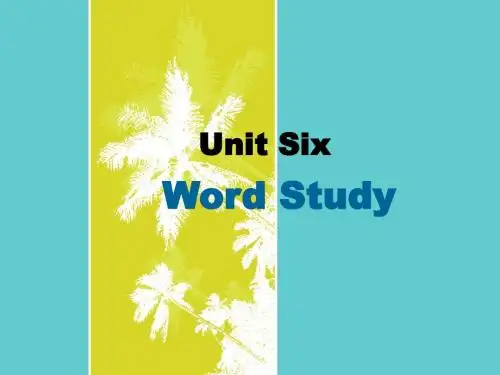
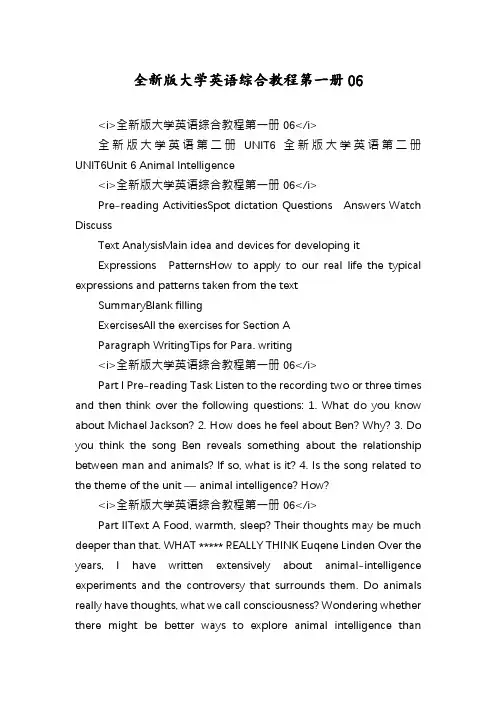
全新版大学英语综合教程第一册06<i>全新版大学英语综合教程第一册06</i>全新版大学英语第二册UNIT6 全新版大学英语第二册UNIT6Unit 6 Animal Intelligence<i>全新版大学英语综合教程第一册06</i>Pre-reading ActivitiesSpot dictation Questions Answers Watch DiscussText AnalysisMain idea and devices for developing itExpressions PatternsHow to apply to our real life the typical expressions and patterns taken from the textSummaryBlank fillingExercisesAll the exercises for Section AParagraph WritingTips for Para. writing<i>全新版大学英语综合教程第一册06</i>Part I Pre-reading Task Listen to the recording two or three times and then think over the following questions: 1. What do you know about Michael Jackson? 2. How does he feel about Ben? Why? 3. Do you think the song Ben reveals something about the relationship between man and animals? If so, what is it? 4. Is the song related to the theme of the unit ― animal intelligence? Ho w?<i>全新版大学英语综合教程第一册06</i>Part IIText A Food, warmth, sleep? Their thoughts may be much deeper than that. WHAT ***** REALLY THINK Euqene Linden Over the years, I have written extensively about animal-intelligence experiments and the controversy that surrounds them. Do animals really have thoughts, what we call consciousness? Wondering whether there might be better ways to explore animal intelligence thanexperiments designed to teach human signs, I realized what now seems obvious: if animals can think, they will probably do their best thinking when it serves their own purposes, not when scientists ask them to. And so I started talking to vets, animal researchers, zoo keepers. Most do not study animal intelligence, but they encounter it, and the lack of it, every day. The stories they tell us reveal what I'm convinced is a new window on animal intelligence: the kind of mental feats animals perform when dealing with captivity and the dominant species on the planet ― humans.<i>全新版大学英语综合教程第一册06</i>Let's Make a Deal Consider the time Charlene Jendry, a conservationist at the Columbus Zoo, learned that a female gorilla named Colo was handling a suspicious object. Arriving on the scene, Jendry offered Colo some peanuts, only to be met with a blank stare. Realizing they were negotiating, Jendry raised the stakes and offered a piece of pineapple. At this point, while maintaining eye contact, Colo opened her hand and revealed a key chain. Relieved it was not anything dangerous or valuable, Jendry gave Colo the pineapple. Careful bargainer that she was, Colo then broke the key chain and gave Jendry a link, perhaps figuring. Why give her the whole thing if I can get a bit of pineapple for each piece? If an animal can show skill in trading one thing for another, why not in handling money? One orangutan named Chantek did just that in a sign-language study undertaken by anthropologist Lyn Miles at the University of Tennessee. Chantek figured out that if he did tasks like cleaning his room, he'd earn coins to spend on treats and rides in Miles's car. But the orangutan's understanding of money seemed to extend far beyond simple dealings. Miles first used plastic chips as coins, but C hantek decided he could expand the money supply by breakingchips in two. When Miles switched to metal chips, Chantek found pieces of tin foil and tried to make copies. Miles also tried to teach Chantek more virtuous habits such as saving and sharing. Indeed, when I caught up with the orangutan at Zoo Atlanta, where he now lives, I saw an example of sharing that anyone might envy. When Miles gave Chantek some grapes and asked him to share them, Chantek promptly ate all the fruit. Then, as if he'd just remembered he'd been asked to share, he handed Miles the stem<i>全新版大学英语综合教程第一册06</i>Tale of a Whale Why would an animal want to cooperate with a human? Behaviorists would say that animals cooperate when they learn it is in their interest to do so. This is true, but I don't think it goes far enough. Gail Laule, a consultant on animal behavior, speaks of Orky, a killer whale, she knew. “Of all the animals I've worked with, he was the most intelligent,“ she says. "He would assess a situation and then do something based on the judgments he made." Like the time he helped save a family member. When Orky's mate, Corky, gave birth, the baby did not thrive at first, and keepers took the little whale out of the tank by stretcher for emergency care. Things began to go wrong when they returned the baby whale to the tank. As the workers halted the stretcher a few meters above the water, the baby suddenly began throwing up through its mouth. The keepers feared it would choke, but they could not reach the baby to help it. Apparently sizing up the problem, Orky swam under the stretcher and allowed one of the men to stand on his head, something he'd never been trained to do. Then, using his tail to keep steady, Orky let the keeper reach up and release the 420-pound baby so that it could slide into the water within reach of help.<i>全新版大学英语综合教程第一册06</i>Primate Shell Game Sometimes evidence of intelligence can be seen in attempts to deceive. Zoo keeper Helen Shewman of Seattle's Woodland Park Zoo recalls that one day she dropped an orange through a feeding hole for Melati, an orangutan. Instead of moving away to get it, Melati looked Shewman in the eye and held out her hand. Thinking the orange must have rolled off somewhere inaccessible, Shewman gave her another one. But when Melati moved off, Shewman noticed the original orange was hidden in her other hand. Towan, the colony's dominant male, watched this whole trick, and the next day he, too, looked Shewman in the eye and pretended that he had not yet received an orange. "Are you sure you don't have one?" Shewman asked. He continued to hold her gaze steadily and held out his hand. Giving in, she gave him another one, then saw that he had been hiding his orange underneath his foot. What is intelligence anyway? If life is about survival of a species ― and intelligence is meant to serve that s urvival ― then we can't compare with pea-brained sea turtles, which were here long before us and survived the disaster that wiped out the dinosaurs. Still, it is com forting to realize that other species besides our own can stand back and assess the world around them, even if their horizons are more limited than ours. (928 words)<i>全新版大学英语综合教程第一册06</i>New Words and Expressionsextensively ad. to a large extent, or in a large amount 广泛地;大量地intelligence n. 智力intelligent a. 聪明的,有才智的controversy n. 争论,争议surround vt. be or go all around (sth. or sb.) 围绕;包围consciousness n. 意识explore vt. examine thoroughly, learn about 探究,探索<i>全新版大学英语综合教程第一册06</i>obvious a. easy to see and understand; clear 明显的vet n. 兽医encounter vt. meet, esp. unexpectedly 遇到,遭遇reveal vt. make (sth.) known 展示;揭露convince vt. make (sb.) feel sure by the use of argument or evidence 使确信,使信服feat▲ n. 技艺;业绩,功绩captivity n. 被俘;监禁;束缚<i>全新版大学英语综合教程第一册06</i>dominant a. ruling; most important or strongest 统治的;占优势的species n. (单复同)物种make a deal reach an agreement or arrangement, esp. in business or politics 达成交易conservationist n. 自然资源保护论者female a. 雌的;女(性)的n. 雌性的动物或植物;女人gorilla n. 大猩猩suspicious▲ a. causing or showing a feeling that sth. is wrong 可疑的;猜疑的<i>全新版大学英语综合教程第一册06</i>peanut▲ n. 花生blank a. without expression; without writing, or other marks 没有表情的;空白negotiate vi. discuss in order to come to an agreement 谈判,协商stake n. (usu.pl) 奖品;奖金;赌注pineapple n. 凤梨,菠萝maintain vt. continue to do or have (sth.) 保持;继续relieve vt. free (sb.) from pain, anxiety, etc.; ease (pain, anxiety, etc.) 使减轻痛苦或焦虑等;减轻(痛苦或焦虑等)<i>全新版大学英语综合教程第一册06</i>link n. 链环;环节;联系v. join or connect 联系,连接orangutan n. 猩猩undertake vt. (undertook, undertaken) carry out; take upon oneself (a task, etc.) 从事;承担(任务等anthropologist n. 人类学者figure out understand; reason out 理解;推断出extend v. (cause to) stretch or reach; make larger or longer 延伸,伸展;扩大;加长dealing n. (usu.pl) business relations 交易,买卖<i>全新版大学英语综合教程第一册06</i>plastic a. 塑料的chip n. 薄片;碎片;集成电路片expand v. (cause to) grow larger 扩大,扩展switch v. change; shift 转换,变换foil▲ n. 金属薄片,箔virtuous a. showing moral goodness 有道德的;善良的envy vt., n. 妒忌;羡慕grape n. 葡萄<i>全新版大学英语综合教程第一册06</i>promptly ad. immediately 立即地stem n. 茎,(树)干,(叶)梗whale n. 鲸cooperate vi. act or work together 合作,协作behaviorist n. 行为主义者in sb.'s interest(s) to sb.'s advantage 为了某人的利益go far help very much; achieve much success 帮助很大;很有成效<i>全新版大学英语综合教程第一册06</i>consultant n. 顾问behavior n. the way one acts or behaves 举止,行为assess vt. judge the quality, importance or worth of 评估,估量judgment n. 判断;意见,看法mate n. 配偶;伙伴,同事thrive vi. grow strong and healthy; develop well 茁壮成长;兴旺at first at the beginning 起先<i>全新版大学英语综合教程第一册06</i>stretcher n. 担架emergency n. an unexpected anddangerous happening which must be dealt with at once 紧急情况;突然事件go wrong stop developing well 有毛病,出故障halt v. (cause to) stop 停住,停止throw up (infml) vomit 呕吐apparently ad. it is clear (that) 明显地size up carefully examine (a situation or person) in order to make a judgement 估量,判断<i>全新版大学英语综合教程第一册06</i>release vt. set free 释放slide v. (cause to) move smoothly along a surface (使)滑动primate n. 灵长目动物evidence n. sth. that gives a reason for believing sth.; trace 证据;迹象deceive v. try to make(sb.) believe sth. that is false 欺骗inaccessible a. very difficult or impossible to reach 达不到的;难得到的original a. first or earliest 最初的;原始的<i>全新版大学英语综合教程第一册06</i>colony n. (生长在同一地方的动物或植物)群,群体;殖民地male n. 雄性动物或植物;男子a. 雄的;男(性)的gaze n., v. 凝视,注视give in让步;屈服;投降underneath prep., ad. under or below 在…下面,在…底下pea-brained a. 笨的turtle n. (海)龟<i>全新版大学英语综合教程第一册06</i>survive v. remain alive in spite of; continue to live or exist after 幸免于;继续存在,幸存survival n. disaster n. an event causing great suffering and damage 灾难wipe out get rid of or destroy 消灭,消除dinosaur n. 恐龙horizon n. 眼界,见识;地平线<i>全新版大学英语综合教程第一册06</i>Proper Names Ugene Linden 尤金林登Charlene Jendry 查伦延德里Columbus Zoo 哥伦布动物园Colo 科洛(文中指动物名) Chantek 夏特克(文中指动物名) Lyn Miles 琳迈尔斯University of Tennessee 田纳西大学Zoo Atlanta 亚特兰大动物园<i>全新版大学英语综合教程第一册06</i>Gail Laule 盖尔劳尔Orky 奥基(文中指动物名) Corky 科基(文中指动物名) Helen Shewman 海伦休曼Seattle 西雅图(美国华盛顿州西部港市) Woodland Park Zoo 伍德兰公园动物园Melati 梅拉蒂(文中指动物名) Towan 托温(文中指动物名。
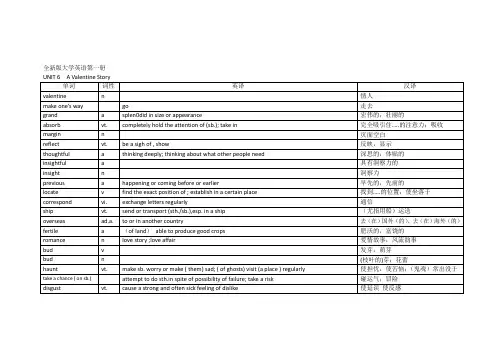
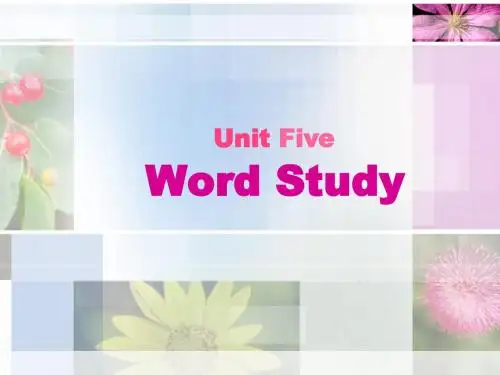
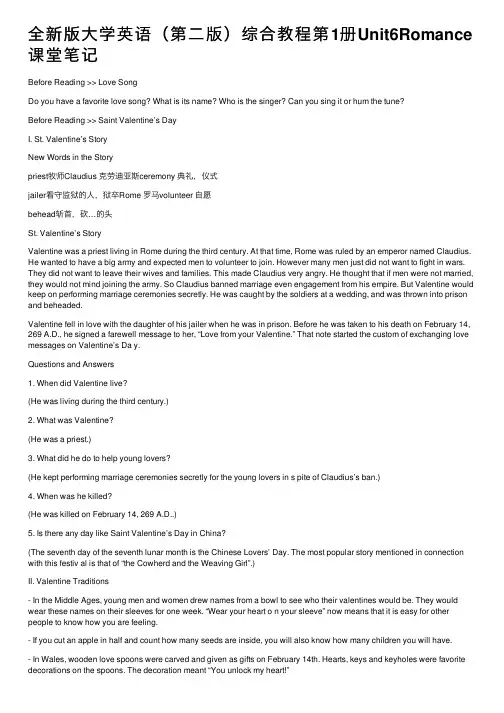
全新版⼤学英语(第⼆版)综合教程第1册Unit6Romance 课堂笔记Before Reading >> Love SongDo you have a favorite love song? What is its name? Who is the singer? Can you sing it or hum the tune?Before Reading >> Saint Valentine’s DayI. St. Valentine’s StoryNew Words in the Storypriest牧师Claudius 克劳迪亚斯ceremony 典礼,仪式jailer看守监狱的⼈,狱卒Rome 罗马volunteer ⾃愿behead斩⾸,砍…的头St. Valentine’s StoryValentine was a priest living in Rome during the third century. At that time, Rome was ruled by an emperor named Claudius. He wanted to have a big army and expected men to volunteer to join. However many men just did not want to fight in wars. They did not want to leave their wives and families. This made Claudius very angry. He thought that if men were not married, they would not mind joining the army. So Claudius banned marriage even engagement from his empire. But Valentine would keep on performing marriage ceremonies secretly. He was caught by the soldiers at a wedding, and was thrown into prison and beheaded.Valentine fell in love with the daughter of his jailer when he was in prison. Before he was taken to his death on February 14, 269 A.D., he signed a farewell message to her, “Love from your Valentine.” That note started the custom of exchanging love messages on Valentine’s Da y.Questions and Answers1. When did Valentine live?(He was living during the third century.)2. What was Valentine?(He was a priest.)3. What did he do to help young lovers?(He kept performing marriage ceremonies secretly for the young lovers in s pite of Claudius’s ban.)4. When was he killed?(He was killed on February 14, 269 A.D..)5. Is there any day like Saint Valentine’s Day in China?(The seventh day of the seventh lunar month is the Chinese Lovers’ Day. The most popular story mentioned in connection with this festiv al is that of “the Cowherd and the Weaving Girl”.)II. Valentine Traditions- In the Middle Ages, young men and women drew names from a bowl to see who their valentines would be. They would wear these names on their sleeves for one week. “Wear your heart o n your sleeve” now means that it is easy for other people to know how you are feeling.- If you cut an apple in half and count how many seeds are inside, you will also know how many children you will have.- In Wales, wooden love spoons were carved and given as gifts on February 14th. Hearts, keys and keyholes were favorite decorations on the spoons. The decoration meant “You unlock my heart!”III. Birds and LoveEuropeans also believe that Feb. 14th is the day when birds begin to choose their mates. Chaucer, Shakespeare, and numerous other poets mention the tradition in their works. In accordance with the tradition, it is believed that a young girl will be able to tell what type of man she will marry based upon the first bird tha t she sees on Valentine’s Da y.- If a young girl sees a blackbird, she will marry a clergyman or priest.- If a young girl sees a robin redbreast, she will marry a sailor or nautical man.- If a young girl sees a goldfinch (or any yellow bird), she will marry a rich man.- If a young girl sees a sparrow, she will marry a farmer or country gentleman.- If a young girl sees a bluebird, she will marry a happy man.- If a young girl sees a crossbill, she will marry an argumentative man.- If a young girl sees a dove, she will marry a good man.- If a young girl sees a woodpecker, she will have no husband.Before Reading >> Public Libraries in the U.S.Public libraries in the U.S. are free to the public. One can get a library card at a local library by filling in a form and showing the librarian a valid ID and something to prove one lives in the neighborhood (e.g., a used and stamped envelope with one’s name as the addressee (收信⼈), one’s phone bill, gas bill, etc.). Besides borrowing books, people go to libraries to borro w videotapes, use the computers there, and attend book readings by authors and other cultural events. Libraries are regarded as community centers.Before Reading >> Group DiscussionDo you think that cyber love is believable and reliable? Why or why not?Global Reading >> Part Division of the TextGlobal Reading >> Further UnderstandingI. For Part 1 Questions and AnswersRead Part 1 carefully and answer the following questions.1. What do you think is the reason that John Blanchard came to the Grand Central Station?(To meet somebody not seen before.)2. Who do you think he was waiting for?(His lover or girlfriend.)3. Why did he straighten his uniform?(To make himself more attractive.)II. For Part 2 Sentence CompletionRead Part 2 carefully and supply the missing information.1. The soft handwriting reflected a thoughtful soul and insightful mind.2. With time and effort he located her address.3. I’d always be haunted by the f eeling that you had been taking a chance on just my beauty, which would disgust me.4. She was a girl he had never seen, yet whose written words had been with him and sustained him unfailingly.III. For Part 3 Multiple ChoiceRead Part 3 carefully and choose the best answer for each question.1. Who was coming toward Blanchard? _______. (B)A. A middle-aged womanB. A young beautiful ladyC. A worn-out soldierD. A lively and naive pupil2. The young lady was dressed in ________. (D)A. the red suitB. the yellow suitC. the blue suitD. the green suit3. How old was the “supposed” Hollis Maynell? ________. (C)A. Over 20B. Over 30C. Over 40D. Over 504. While he spoke Blanchard felt choked by the bitterness of his __________. (A)A. disappointmentB. happinessC. excitementD. enjoyment5. Why did Miss Maynell ask the middle-aged woman to act as her? __________. (D)A. It was a jokeB. It was a sense of humorC. It was April Fool’s DayD. It was some kind of testIV. For Part 4 Questions and AnswersRead Part 4 carefully and answer the following questions.1. What did Miss Maynell want to find out through the test?(The true nature of a heart.)2. How do you understand Houssaye’s remark “tell me whom you love, and I will tell you who you are”?(I can judge you by the person you love. And the saying is equal to a Chinese proverb: 物以类聚,⼈以群分。
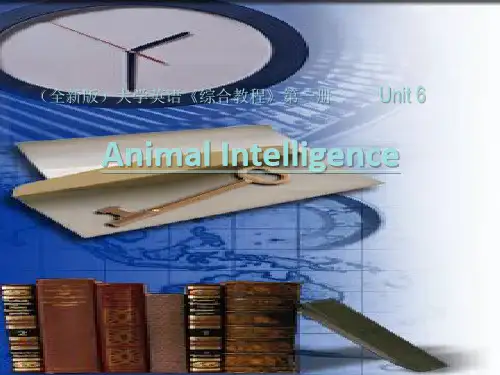

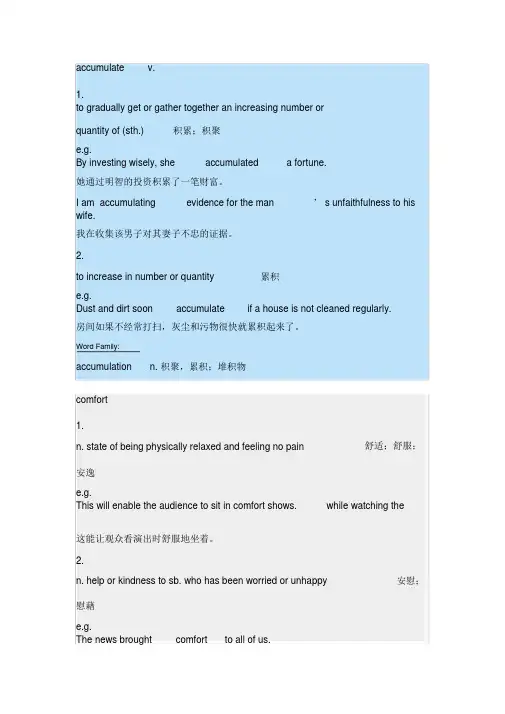
accumulate v.1.to gradually get or gather together an increasing number orquantity of (sth.)积累;积聚e.g.By investing wisely, she accumulated a fortune.她通过明智的投资积累了一笔财富。
I am accumulating evidence for the man’ s unfaithfulness to his wife.我在收集该男子对其妻子不忠的证据。
2.to increase in number or quantity累积e.g.Dust and dirt soon accumulate if a house is not cleaned regularly.房间如果不经常打扫,灰尘和污物很快就累积起来了。
Word Family:accumulation n. 积聚,累积;堆积物comfort1.n. state of being physically relaxed and feeling no pain 安逸e.g.This will enable the audience to sit in comfort shows.这能让观众看演出时舒服地坐着。
舒适;舒服;while watching the2.n. help or kindness to sb. who has been worried or unhappy安慰;慰藉e.g.The news brought comfort to all of us.这条消息让我们都感到安慰。
3.v. to make sb. who is worried or unhappy feel better by being kindand sympathetic to them安慰e.g.The child ran to its mother to be comforted.孩子跑到母亲身边以求得安慰。
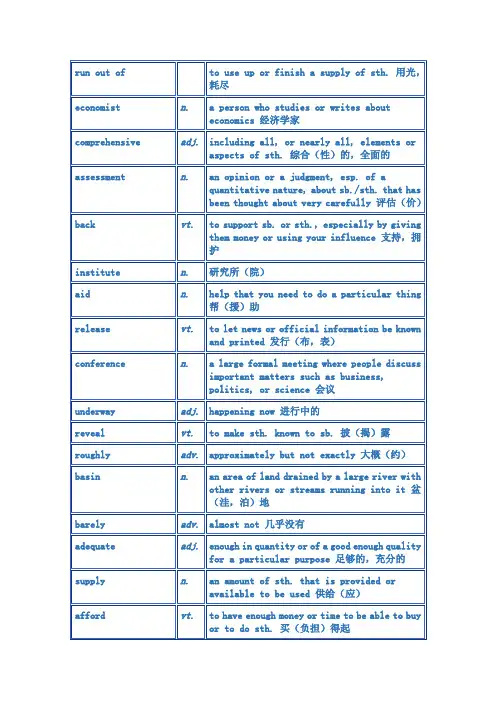
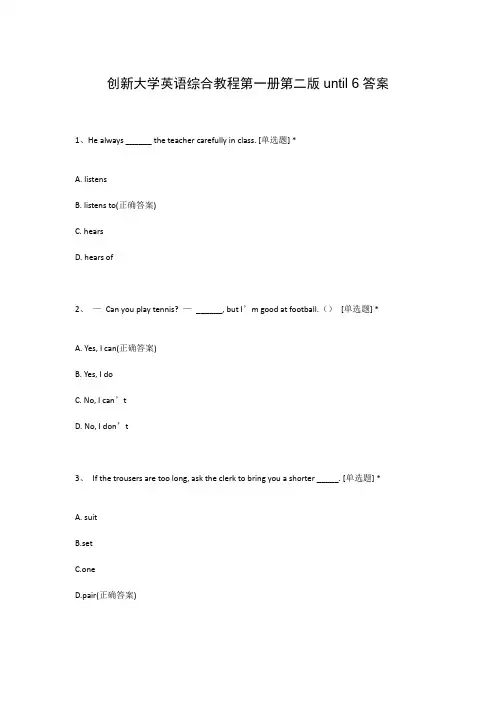
创新大学英语综合教程第一册第二版until 6答案1、He always ______ the teacher carefully in class. [单选题] *A. listensB. listens to(正确答案)C. hearsD. hears of2、—Can you play tennis? —______, but I’m good at football.()[单选题] *A. Yes, I can(正确答案)B. Yes, I doC. No, I can’tD. No, I don’t3、If the trousers are too long, ask the clerk to bring you a shorter _____. [单选题] *A. suitB.setC.oneD.pair(正确答案)4、It _____ us a lot of time to do this job. [单选题] *A. spentB. madeC. took(正确答案)D. cost5、16.We asked ______ engineer we met before to help repair the radio yesterday. [单选题] * A.aB.anC.the(正确答案)D./6、34.My mother usually_______ much time shopping in the supermarkets on weekends. [单选题] *A.spends (正确答案)B.costsC.takesD.pays7、Do you know what()the change in his attitude? [单选题] *A. got throughB. brought about(正确答案)C. turned intoD. resulted from8、There are trees on both sides of the broad street. [单选题] *A. 干净的B. 狭窄的C. 宽阔的(正确答案)D. 宁静的9、Last year Polly _______ an English club and has improved her English a lot. [单选题] *A. leftB. sawC. joined(正确答案)D. heard10、Tom didn’t _______ his exam again. It was a pity. [单选题] *A. failB. winC. pass(正确答案)D. beat11、He used to get up at six in the morning,()? [单选题] *A. used heB. did heC. didnt he (正确答案)D. should he12、Can I _______ your order now? [单选题] *A. makeB. likeC. giveD. take(正确答案)13、Her ()for writing was that she wished women to get the right to higher education. [单选题] *A. motivation(正确答案)B. motivateC. effectD. concentration14、He runs so fast that no one can _______ him. [单选题] *A. keep upB. keep awayC. keep up with(正确答案)D. keep on15、97.Go ______ the square and you will find the theatre. [单选题] *A.aboveB.atC.across(正确答案)D.on16、73.The moonlight goes ____ the window and makes the room bright. [单选题] * A.acrossB.through(正确答案)C.overD.in17、Mr. Wang is coming to our school. I can’t wait to see _______. [单选题] *A. herB. him(正确答案)C. itD. them18、There is something wrong with my teeth. I’ve had?a _______. [单选题] *A. toothache(正确答案)B. headacheC. stomachacheD. heartache19、She returns home every year to _______ the Spring Festival. [单选题] *A. celebrate(正确答案)B. shareC. watchD. congratulate20、66.—How much meat do you want?—________.[单选题] * A.Sorry, there isn't anyB.I can't give you anyC.Half a kilo, please(正确答案)D.Twelve yuan a kilo21、—Is this ______ football, boy? —No, it is not ______.()[单选题] *A. yours; myB. your; mine(正确答案)C. your; meD. yours; mine22、Will you be able to finish your homework _______? [单选题] *A. by the timeB. in time(正确答案)C. once upon a timeD. out of time23、His new appointment takes()from the beginning of next month. [单选题] *A. placeB. effect(正确答案)C. postD. office24、21.Design a travel guide for Shanghai! ________ the competition and be the winner! [单选题] *A.JoinB.AttendC.EnterD.Take part in (正确答案)25、Tony wants _______ a job as a language teacher in China. [单选题] *A. findB. findingC. to find(正确答案)D. to be found26、6.Hi, boys and girls. How are you ________ your posters for the coming English Festival at school? [单选题] *A.getting onB.getting offC.getting with (正确答案)D.getting27、I do not have my own room,_____. [单选题] *A. neither does Tom(正确答案)B. neither has TomC. so does TomD. so has Tom28、My camera is lost. I am ______ it everywhere.()[单选题] *A. looking atB. looking for(正确答案)C. looking overD. looking after29、She’s _______ with her present _______ job. [单选题] *A. boring; boringB. bored; boredC. boring; boredD. bored; boring(正确答案)30、()it is to have a cold drink on a hot day! [单选题] *A. What a great funB. How great funC. What great fun(正确答案)D. How a great fun。
Unit 1 Test A off and on 断断续续地,有时take hold 生根,确立associate 使联系起来,使联想assignment(分配的)工作,任务,作业turn out 编写,制作paragraph 段落agony (身心的)极度痛苦assign 分配,分派cheerless阴郁的,沉闷的tedious乏味的,冗长的reputation 名声,名誉inability无能,无力inspire激励,鼓舞formal 刻板的,拘谨的,正式的,正规的rigid一成不变的,严格的out of date过时的excessively过分地prim古板的,拘谨的,循规蹈矩的,整洁的severe朴素的,严重的,剧烈的wavy波形的,波浪形的necktie领带pointed有尖的,尖的jaw颌,颚comic 滑稽的,喜剧的,连环漫画(册)antique古物,古玩tackle处理,应付informal(指讲话,文字)口语体的,非正式的essay散文,小品文,论说文distribute分发,分配,分送finally最终,终于face up to勇敢地接受或对付scan浏览,粗略地看spaghetti意大利式细面条title标题,题目,给...加标题,加题目于extraordinary不同寻常的,奇特的sequence一连串相关的事物,次序,顺序image形象,印象,(图)像vivid生动的,逼真的adult成年人,成年动物recall回想起,回忆起social社会的,社交的,交谊的respectable可敬的,体面的,文雅的put down写下recapture再现,再次经历relive再体验,重温violate违背,违反compose创作turn in交(作业)command命令,指令discipline惩罚,处分,纪律what’s more而且,此外,更有甚者contempt轻视,轻蔑ridicule嘲笑,嘲弄,被戏弄open-hearted诚挚的enjoyment愉快,欢乐,满意hold back控制(感情,眼泪等)avoid避免demonstration表明,证明calling职业,使命career生涯,事业,职业seal印章,图章essence本质,精髓Unit 1 Test Btradition传统award授予,给予valedictorian致告别词的毕业生代表maintain保持,维持look forward to盼望participate in参加registration登记,注册fee费(如会费等)gym健身房,体育馆compare to相比,比得上falsify窜改,歪曲plus(常置于被修饰词后面)比...略好(或略高)一些的,加,加上tie平手,不分胜负drown out(指声音)淹没here and there 各处filter渗过,渗透resign顺从,听任,辞职make it办成,做到,赶上principal校长,院长policy方针,政策regarding关于,至于dignity尊严muster激起,聚集represent代表,象征expectation期待,预期clasp紧抓,紧握significance意义,意思hoe用锄除(草),用锄整(地)spring up迅速生长或出现delicate脆弱的,柔软的withdrawn沉默寡言的,不善交际的drag拖着脚步走exception例外tremble颤抖,哆嗦yell叫喊innocent天真无邪的,清白的hug拥抱pat轻拍Unit 2 Test A be lost in(lose oneself in)专心致志于windshield(汽车的)挡风玻璃cab出租车available可用的,可得到的apologetically 道歉的,带有歉意的or something诸如此类的事go ahead 继续,开始know/learn by heart记住,能背出on the road 在旅途中estimate估计might/may (just)as well不妨,(也)无妨not much of a不太好的keep up保持correspondence通信(联系),信件practically自始至终,一直neighborhood街坊,四邻kind/sort of有几分,有点儿lose touch(with sb)失去联系guy家伙,伙计a couple of几个,一对,一双tough不幸的,困难的,坚固的,坚强的on one’s mind 记挂在心头keep in touch(with)(与...)保持联系,保持接触come up(尤指意想不到地)发生,出现shrug耸(肩)urge力劝,催促postpone推迟,使延期reference提及,谈到,参考,查阅absolutely完全地,极其reunion(家人,朋友,同事等久别后的)重聚go by(时间)逝去hang out闲荡,徘徊every now and then有时mostly几乎全部,多半,大体awful非常的,极大的,可怕的,糟糕的choke(使)窒息,堵塞choke up(因激动等)哽得说不出话,堵塞destination目的地skip略过,跳过,跳跃sorrowful伤心的,悲伤的in the distance在(相当)远处unpack打开right away立刻,马上Unit 2 Test B let down使失望,不帮助burn off烧掉peer仔细看uneasy不安的,担心的bump颠簸着前进get rid of消灭,除去stuff东西,原料tow拖,拉,牵引soak(使)浸透pitch颠簸swing(使)突然转向burst into突然(烧,哭等)起来flame火焰,火舌spin(使)旋转fling抛,扔,掷roar轰鸣(声),吼叫(声)crash撞,撞坏,坠毁steer驾驶bare赤裸的grip紧握explosion爆炸extent程度,范围injury伤害,损伤worse still更糟糕的是in bad/good shape 身体状况差(好)despair绝望hang on 坚持permanently永久地,固定地principle信条,原则,原理draw on利用,动用,靠character品德,品质,性格lean倚,靠exclaim惊叫,呼喊grab一把抓住slide(使)滑动ease减轻(痛苦,负担等)grin咧嘴笑medal奖章,奖牌,勋章courageous勇敢的,无畏的rescue援救,营救highlight最重要的事件,最精彩的部分Unit 3 Test Alikely可能的,可能privileged有特权的privilege特权minority少数do without没有...而设法对付过去highly很,非常risky危险的,有风险的nasty令人难受的brutish野兽般的,野蛮的anyway不管怎么说put/turn the clock back倒退,开倒车cut off切断,中断,切下,剪下competition竞争,比赛bring about引起,导致moreover而且,再者inquiring好问的,爱探索的inquire询问global世界的,全球的suppress抑制,压制initiative首创精神,主动inventiveness发明才能,创造力slow down减慢rate速度,比率ensure保证,确保democratic民主的informed有知识的,了解情况的,明智的inform告诉,通知at the moment此刻,目前in two minds犹豫不决,三心二意steady平稳的,稳定的evident明显的cartoon漫画,动画片element成分,元素astronomy天文学series连续,系列,系列节目fiction小说,虚构harness驾驭,利用background背景acid酸(性的),酸味的(物质)greenhouse温室nuclear原子核的,核心的weapon武器genetic基因的,遗传(学)的engineering工程,工程学basis基础lie in在于rote死记硬背learn by rote死记硬背地学习relevance相关,关联in terms of从...方面(或角度)来说,按照,根据equation等式,方程(式)brief简洁的,短暂的mathematical数学的halve将...减半tend倾向,趋向in the form of呈...的形状,以...形式precise精确的qualitative定性的,性质上的grasp掌握,了解concept概念sufficient充分的,足够的convey传达,表达diagram图表,图解framework框架,结构molecular分子的transistor晶体管,晶体管收音机put across解释清楚,使被理解proportion比例,部分truly真正地,确实地magic魔术,魔力fit into适合,符合,属于producer(电影,电视片等的)制片人,生产者,制造人responsibility责任educate教育entertain给...以欢乐,招待hence因此,从此contact与...接触alien外国的,陌生的civilization文明Unit 3 Test B deadline最后期限headline(报纸上新闻报导等的)标题immediately直接地,贴近地victim受害者,罹难者frustrate使沮丧,使灰心yield泄露,产生step by step逐步地,稳定地outcome结果result in导致,结果是gradual逐渐的,渐变的process过程conclusion结论propose提出,建议random任意的,随机的compare with与...比较evaluate评估,评价characterize成为...的特征bulk大部分,(巨大的)体积submit提交,呈递publish发表,出版professional专业的,职业的press release(通讯社或政府机构等发布的)新闻稿challenge挑战amount数量,总数wear down(使)变小,变少,变弱organic有机(体)的,只施用有机肥料的trumpet大肆宣扬reverse挫折,逆境somehow以某种方式Unit 4 Test A driveway宅旁私家车道mow修剪(草坪),刈(草)lawn草地,草坪comprehend理解,了解,领会turn away拒绝帮忙,不让...进入weed除去...的杂草,除草,杂草,野草assume假设,以为compliment赞扬,赞美的言辞或行为work out制定出,解决,算出weekly每周的,一周一次的clean up打扫,清除do with对待,处理determination决心,决定personnel人事部门,全体人员,全体职员apprentice学徒capacity能力,才能blueprint蓝图micrometer测微计,千分尺precision精密,精确(性)turn down拒绝skilled熟练的,有技巧的,技术性的grinder磨工grind磨,磨碎,碾碎instrument工具,器械,仪器for sale待售wreck残破物,(尤指失事船只,飞机等的)残骸call on拜访banker银行家,银行高级职员loan借,贷,贷款character(人的)品德,品质,性格damn丝毫reluctantly勉强地mortgage抵押借款,按揭down payment定金,(分期付款的)初付款额discard抛弃odds and ends零星杂物,琐碎物品screen纱门,纱窗,屏,荧屏hardware五金器具,(计算机的)硬件spot地点,斑点confidence信心amaze使惊愕,使诧异amazement惊愕,诧异diet日常饮食send for派人去叫,召唤,派人去取hunt寻找,打猎,猎取abandon抛弃,放弃property(房)地产,财产shed小屋,棚sometime某个时候sponsor为...做保证人,主办,发起,保证人,主办人,发起人amuse逗乐,给...提供娱乐approach接近millionaire百万富翁pass away去世check on检查,调查,察看handle管理,处理,操纵livable适于居住的homey舒适的,像家一样的stature身材,身高,境界industrialist工业家,实业家route路线,路程principle信条,原则,原理vision远见,视觉,视力optimism乐观,乐观主义above all最重要的是integrity正直,完整rung(梯子的)横档,梯级basement地下室giant巨大的,巨人balance平衡,余额balance sheet资产负债表decimal小数Unit 4 Test B illegal不合法的,违法的immigrant(外来)移民,移民的,移入的taco stand卖玉米面卷的摊子connection连接,联系,(可资利用的)熟人,关系put up with忍受,容忍in search of寻找head for向...行进supervise监督,指导land赢得,得到temporary暂时的,临时的response回答,反应risk冒...的危险,(使)遭受危险,危险,风险acquire(靠自己的能力,努力等)取得,获得,学到make(both)ends meet勉强维持生计,使收支相抵associate’s degree准学士学位environment环境,周围状况on the side作为兼职stand a chance of有...的希望,有...的可能prospect前景,预期,展望reserve保留,储备,预订rare稀有的,罕见的,不寻常的former以前的,早先的,旧时的quit停止,放弃deserve应受,应得,值得impress给...深刻的印象,使钦佩show up来到,露面flip转动,使翻转humanistic人道主义的,人本主义的Unit 5 Test A obituary讣告die of死于coronary冠状动脉的thrombosis血栓(形成)acquaintance相识的人,(略微的)了解instantly立刻,马上workaholic工作狂classic典范,典型,典型的day off休息日conceivably可想到的,可想象的retire退休executive(企业等中的)行政领导,管理人员extracurricular课外的monthly每月的,每月一次的golf高尔夫球运动salad色拉,凉拌蔬菜overweight肥胖的,超重的,过重的survivor遗留的家属,幸存者,生还者survive比...活得长,经历...后幸存marketable适合市场需求的,可出售的mother抚育(孩子)give up放弃compete竞争,对抗compete against/with与...竞争,与...对抗care for照看,照顾dearly非常地beloved深爱的,亲爱的eldest第一个出生的,年龄最大的manufacturer(尤指用机器)大量制造funeral葬礼embarrass使尴尬,使局促不安newly新近地married结婚的,已婚的odd临时的,不固定的grass大麻grab at抓住,夺得favorite特别受喜爱的人(或物),最喜欢的stay up醒着,不去睡board为...提供膳宿,搭伙,寄宿widow寡妇deceased死的the deceased已死的人replace代替,取代look sb in the eye直视某人bitter愤怒的,委屈的,怨恨的straighten out解决finance财政,金融,财源,财力stock股票,证券,公债option期权,选择stock option股票期权,优价认股权and all that诸如此类的heart-attack心脏病发作natural非常适合的人pick out辨认出,分辨出lineup(为接受检查等而排列的)一行人,一排人discreet谨慎的,(言行)审慎的inquiry打听,询问replacement接替者,替代物ask around四处打听Unit 5 Test B pop up出现,发生enthusiastic极感兴趣的,热心的among others(除列举到的之外)还有许多distract使分心relationship关系,关联,亲属关系socialize交往,交际delegate授(权),把...委托给下级input投入(物),输入typically通常,典型地disarray混乱,紊乱intimacy亲昵关系,亲密divorce离婚focus on集中depression忧愁,沮丧link连接,联系concern担心,忧虑,关心的事extreme极度的in short总之,简言之well-being康乐,安乐solution解决,解决方法,解答addition瘾,沉溺survey调查priority优先考虑的事relax松弛,放松detail细节oriented以...为方向的,重视...的schedule将...列为计划表overall包括一切的,总的fulfilling令人心满意足的reliable可信赖的,可靠的diversion转向,转移productive多产的on one’s own独自地,独立地staff全体雇员let go松开,释放Unit 6 Test A valentine情人make one’s way走去grand宏伟的,壮丽的absorb完全吸收住...的注意,吸收margin页边空白reflect反映,显示thoughtful深思的,体贴的insightful具有洞察力的insight洞察力previous早先的,先前的locate找到...的位置,使坐落于correspond通信ship(尤指用船)运送overseas去(在)国外(的),去(在)海外(的)fertile肥沃的,富饶的romance爱情故事,风流韵事bud发芽,萌芽,(枝叶的)芽,花蕾haunt使担忧,使苦恼,(鬼魂)常出没于take a chance (on sth)碰运气,冒险disgust使厌烦,使反感whichever无论哪个或哪些lapel(西服上衣的)翻领sustain支持,使(努力等)持续下去,保持unfailing永恒的,无穷的slim苗条的,细小的,微小的curl鬈发chin下巴,颏provocative挑逗的,挑衅的curve(使)弯曲go sb’s way与某人同路murmur轻声说,咕哝more than a little很,非常ankle踝,踝节部thrust挤入,插入,猛推heel(鞋,袜等的)后跟,脚后跟,踵split(使)裂开,破裂keen强烈的,热切的longing渴望companion陪伴uphold支持,维护sensible通情达理的,理智的kindly亲切的,和蔼的,仁慈的glow光亮,光辉hesitate踌躇,犹豫grip握紧,紧握leather(动物的)皮,皮革identify识别grateful感激的be grateful to(sb)for(sth) 为某事感激某人square挺直(肩膀)salute(向...)行举手礼lieutenant海军上尉,陆军中尉broaden(使)变宽,(使)扩大wisdom智慧,明智in response to作为对...的回应Unit 6 Test B come across偶然遇见,碰上make out辨认出hope for希望,期待clue线索identify身份other than除了nursing home(尤指接纳老年人的)私人疗养院exchange交换,互换match up to与...一样好,比得上lead线索for sure毫无疑问security治安保卫,安全,安全感goodness天哪relief轻松,宽慰be in love with (sb) 热恋着(某人)come to an end结束adjust校准,调准catch up on (sth) 事后了解关于...的情况,弥补(耽搁下来的工作等)knot(绳等的)结tie the knot结婚erect挺直的,直立的Unit 7 Test Aextensively广泛地,大量地intelligence智力intelligent聪明的,有才智的controversy争论,争议surround围绕,包围consciousness意识explore探究,探索obvious明显的vet兽医keeper(动物园的)饲养员encounter遇到,遭遇reveal展示,揭露convince使确信,使信服feat技艺,业绩,功绩captivity被俘,监禁,束缚dominant统治的,占优势的species物种planet行星make a deal达成交易conservationist自然资源保护论者gorilla大猩猩suspicious可疑的,猜疑的peanut花生only to结果却,不料blank有表情的,空白的negotiate谈判,协商stake奖品,奖金,赌注pineapple凤梨,菠萝relieve使减轻痛苦或焦虑等,减轻(痛苦或焦虑等)orangutan猩猩undertake从事,承担(任务等)anthropologist人类学者figure out理解,推断出extend延伸,伸展,扩大,加长dealing交易,买卖chip薄片,碎片,集成电路片expand扩大,扩展switch转换,变换foil金属薄片,箔virtuous有道德的,善良的promptly立即地stem茎,(树)干,(叶)梗whale鲸cooperate合作,协作behaviorist行为主义者in sb’s interest(s)为了某人的利益go far帮助很大,很有成效consultant顾问behavior举止,行为assess评估,估量judgment判断,意见,看法mate配偶,伙伴,同事thrive茁壮成长,兴旺at first起先stretcher担架emergency紧急情况,突然事件go wrong有毛病的,出故障halt停住,停止throw up呕吐apparently明显地size up估量,判断release释放slide(使)滑动primate灵长目动物evidence证据,迹象deceive欺骗inaccessible达不到的,难得到的original最初的,原始的colony(生长在同一地方的动物或植物)群,群体,殖民地gaze凝视,注视give in让步,屈服,投降underneath在(...)下面,在(...)底下pea-brained笨的turtle(海)龟survival生存,幸存disaster灾难wipe out消灭,消除dinosaur恐龙horizon眼界,见识,地平线Unit 7 Test Bcautious谨慎的display流露,显示,展示adequate充分的,足够的accompany陪伴,陪同exhibit展示nest巢,窝vacant无表情的,空着的not have the heart(to do sth)不愿,不忍心(做某事)status地位,身份flock(鸟,兽等)一群pull oneself together振作起来at first sight乍一看,一见之下instinct本能,生性purchase买,购买nevertheless然而,虽然如此twist转动,(使)扭曲,扭伤pair off(使)成对,成双decline谢绝take to喜欢上reproduce生殖,繁育magnificent宏大的,壮观的,出色的shed light on阐明tolerance容忍,宽容,忍耐heap(sth)on(sb)大量地给予(某人)(某物)marital婚姻的,夫妻的field biologist野外生物学家coyote(北美草原的)郊狼indicate表明observe观察,注意lick舔tell of讲述otter獭,水獭get around各处走动make a habit of形成...的习惯alarm使惊慌,使恐慌by any chance或许,可能in the world竟然,到底,究竟reject拒绝接受Unit 8 Test A fable寓言teenager青少年run out of用完,耗尽file档案,卷宗folder文件夹drugstore(兼营杂货的)药房handful一把,少量modestly不太多,不太大,适中upset使苦恼,使心烦意乱ignorant无知的,不知道的ignorance无知,愚昧senior(大学或中学)毕业班的学生private私人的,私有的slice部分,(薄薄的)一片calculation计算nonexistent不存在的chill(使)变冷,(使)不寒而栗indifference漠不关心sum总结,概述,合计sum up总结,概括financial财政的,金融的accumulate积累,积聚ancestor祖先,祖宗intellectual智力的affect影响industrial工业的function运作,起作用,作用,功能idle懒散的,空闲的jam发生故障,卡住,堵塞break down停止运转,失败,垮了drive(sth)home(to sb)使清楚无误地理解humble谦卑的,卑微的dramatize将...改编为剧本,将...戏剧化headphone头戴式受话器,耳机portable便携(式)的,手提(式)的peasant农民,雇农county(英国的)郡,(美国的)县hut小屋,棚屋search for寻找poverty贫穷,贫困leisure空闲,闲暇luxury奢侈品,奢华,奢侈mill工厂,制造厂subway地铁better off更富有,更舒服foe敌人scare(使)惊慌,(使)恐惧foxhole散兵坑(小型掩体)wake up醒了porter(旅馆,火车站等的)搬行李工人,搬运工人complex复杂的manual体力的,手工做的slum贫民窟plumbing(水,煤气等)管道设施privacy(不受干扰的)独处,隐私,隐秘trash垃圾,废物befriend帮助,以朋友态度对待swear发誓,宣誓make a living by靠...维持生计miracle奇迹faculty官能contemptible令人鄙视的,可轻蔑的coward懦夫Unit 8 Test B ditch抛弃,丢弃multiplication乘法,倍增off-limits禁止使用的access接近,进入,享用seminar研讨会benefit好处,利益,有益于device装置,设备call for要求discourage使灰心,使泄气in the first place首先proceed继续进行competent有能力的,能胜任的essential必要的,最重要的adolescent青少年concentrate on集中(注意力,精力等)于solve解决(问题,困难等)appropriate适当的,得体的cut down减少reflect on思考,沉思effective有效的confuse使困惑what if如果...怎么样communicate交流,交际strategy策略,战略at hand在手边,临近bat眨(眼睛)claim声称,断言commonplace普通的,平凡的section(事物的)一部分circumference圆周factor将...分解因子,因素quadratic二次的sole唯一的contribute作出贡献,贡献出ultimate最终的,根本的。